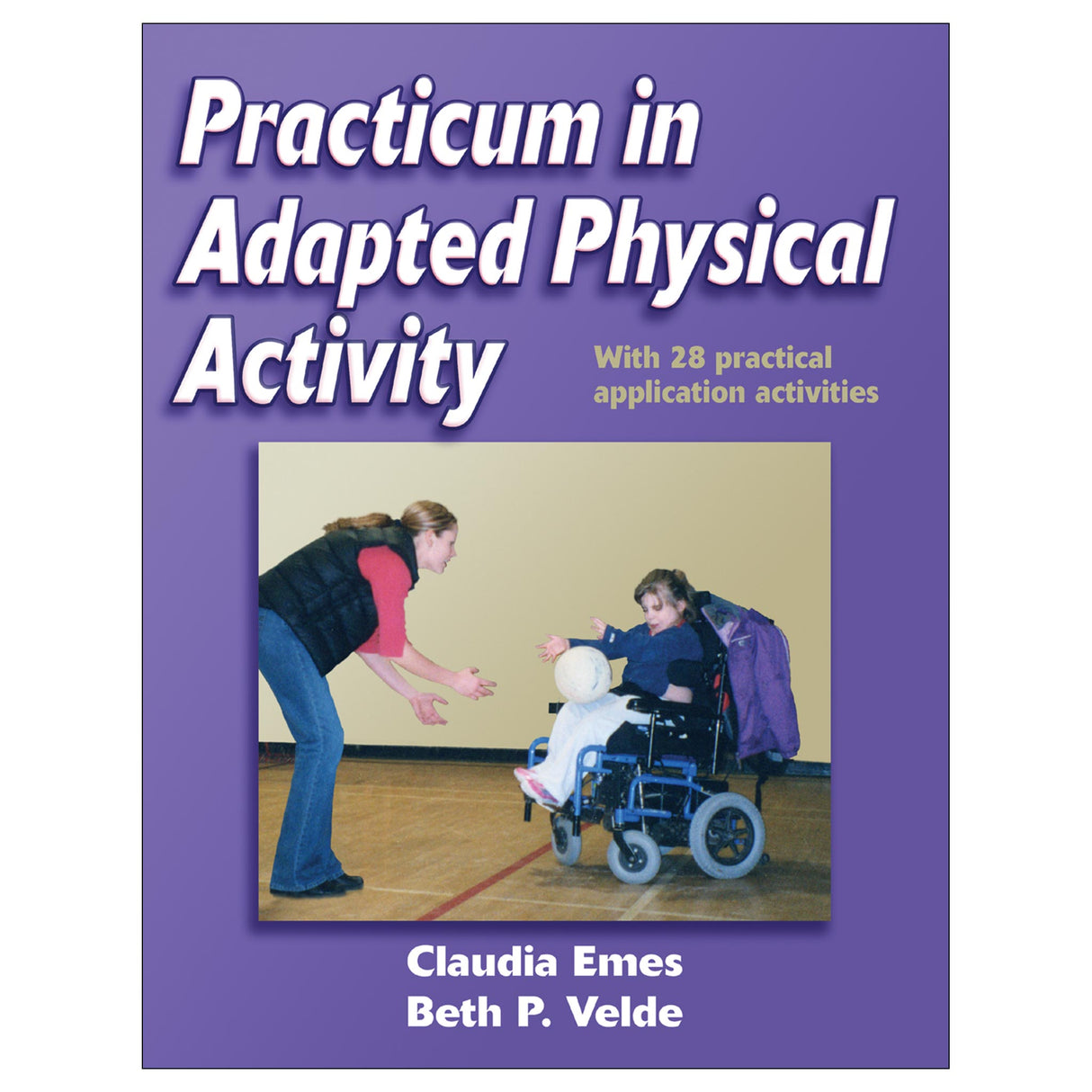Practicum in Adapted Physical Activity
Author: Claudia Emes, Beth Velde
$12.00 CAD
No other workbook will help students learn more, remember more, and take more from their experience than Practicum in Adapted Physical Activity.
Whether students' practica are in adapted physical activity, adapted physical education, therapeutic recreation, general special education, or any program that includes people with disabilities, this workbook will help them prepare for their experience and evaluate it through journal writing, self-assessment, and critical reflective thinking. The book will help ground them in an abilities-based approach to adapted physical activity. And, ultimately, it will enhance their success in their budding careers.
Practicum in Adapted Physical Activity provides students with these opportunities:
- Experience and respond to a variety of settings and challenges when working with people with disabilities
- Process and assimilate their practicum experience and hone their critical-thinking and problem-solving skills
- Evaluate their performances as teachers and leaders and their approaches to working with people with disabilities
- Prepare for job hunting through portfolio-building experiences while sharpening their teaching and leading skills
- Create a reflective journal of their personal learning experiences during the practicum
This hands-on workbook, through the use of its real-life scenarios, self-evaluation checklists, handy tips, and reflective journaling exercises, leads students toward a greater understanding of the structure and purposes of a variety of experiences in practica. It helps them plan strategies for improved field performance, enhances the relationship with their mentor-teachers and leaders, and provides a variety of ways to reflect on the practicum experience and record insights for future reference. It also offers professional portfolio-building tools, assisting students in job hunting. In doing all this, it prepares students to be effective field professionals.
Part I prepares students for their practicum as they learn about service delivery and the tools and strategies to make the practicum successful. It also explores motivational aspects and inclusive teaming.
Part II focuses on different types of practicum supervision, various learning styles, and assessment tools. In Part III, students learn how to evaluate their experiences, reviewing their competencies, evaluating their programs, and taking with them lessons learned as they leave their practica. The exercises in each chapter help them explore and retain the salient information from their practica.
Practicum in Adapted Physical Activity can be used in conjunction with a variety of textbooks, or it can stand alone alongside a practicum experience. This workbook helps students apply the principles they learn, promotes their development as practitioners, and helps them make the most of their practicum experience—all while they prepare for professional employment.
Audience
Workbook and reference for students and instructors in physical education teacher education (PETE), adapted physical education (APE), adapted physical activity (APA), therapeutic recreation, and special education at the university level.
Part I. Setting the Stage: Preparation
Chapter 1. Learning Service Delivery
What Is a Practicum?
The APA Practicum
Changes to Service Delivery
Focusing on You and Your Learning Experience
Summary
Exercise 1.1 Values Confirmation, Self-Awareness, and Ethics
Exercise 1.2 Positive and Negative Attitudes
Exercise 1.3 Words Are Important
Exercise 1.4 Prepracticum Preparation: Self-Assessment of Expertise
Exercise 1.5 Initiating the Practicum: How to Get Started if Your Practicum Has Not Been Prearranged
Chapter 2. Learning Tools and Strategies
Strategies for Successful Participation
Learning From Your Practicum
Asking Critical Questions
Reflective Thinking
Journaling
Summary
Exercise 2.1 Recording Observational Statements
Exercise 2.2 Establishing a Working Relationship With the Person at the Center of Your Practicum
Exercise 2.3 Asking Critical Questions
Exercise 2.4 Reflective Writing
Exercise 2.5 Journaling
Chapter 3. Motivation
Behavior Management
Systems Perspective of Motivation
Person-Centered Planning As Collaboration
Summary
Exercise 3.1 Behavior Changes
Chapter 4. Inclusive Teaming
Collaboration
Summary
Exercise 4.1 Inclusive Team
Part II. Getting Into It: Participation
Chapter 5. Practicum Supervision
Types of Supervision
Effective Supervision
Summary
Exercise 5.1 Goals
Chapter 6. Learning Plans
Learning Styles
Multiple Intelligences
Learning Map
Clarify Expectations
Summary
Exercise 6.1 Learning Style Preferences
Exercise 6.2 Multiple Intelligences
Exercise 6.3 Learning Plan
Chapter 7. Assessment Tools
Assessing the Compatibility Between Person and Activity
Formal and Informal Assessment
Authentic Assessment
Compatibility Overlap
Assessing Environmental Support Systems
Summary
Exercise 7.1 Functional Assessment Leading to a Compatibility Match
Exercise 7.2 Positions of Olkin and Kiger
Exercise 7.3 Sample Assessment for the Practicum Environment
Exercise 7.4 Rubric
Part III. Looking Back: Evaluation
Chapter 8. Reviewing Your Competencies
Reviewing What You Know
Reviewing What You Did
Reviewing Your Results
Reviewing What Others Know About You
Preparing to Deal With Constructive Feedback
Reviewing Postevaluation Outcomes
Learning for Improvement
Summary
Exercise 8.1 Reviewing Competencies
Exercise 8.2 Reviewing Practicum and Career Goals
Chapter 9. Program Evaluation
Assumptions About Evaluation
Types of Evaluation
Listening to the Learner's Voice
Developing a Constructive Review
Collecting Information or Data
Summary
Exercise 9.1 Global Program Evaluation
Exercise 9.2 Constructive Review
Chapter 10. Leaving Your Practicum
Leaving the Participants
Leaving the Supervisor
Leaving the Setting
Lessons Learned
Final Review
Recommendations
The Next Practicum
Rewards of Practicum Placements
Summary
Exercise 10.1 Reviewing Your Practicum
Exercise 10.2 Evaluating Your Practicum Supervision
Exercise 10.3 Evaluating the Practicum Overall
Exercise 10.4 Think Ahead to Your Next Practicum
Appendix: Journal Writing Guidelines





